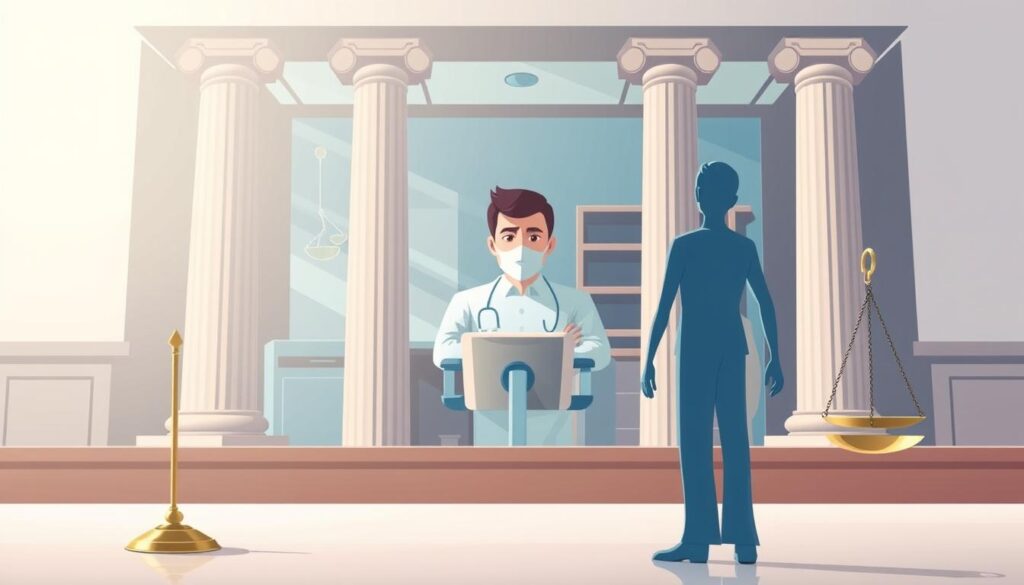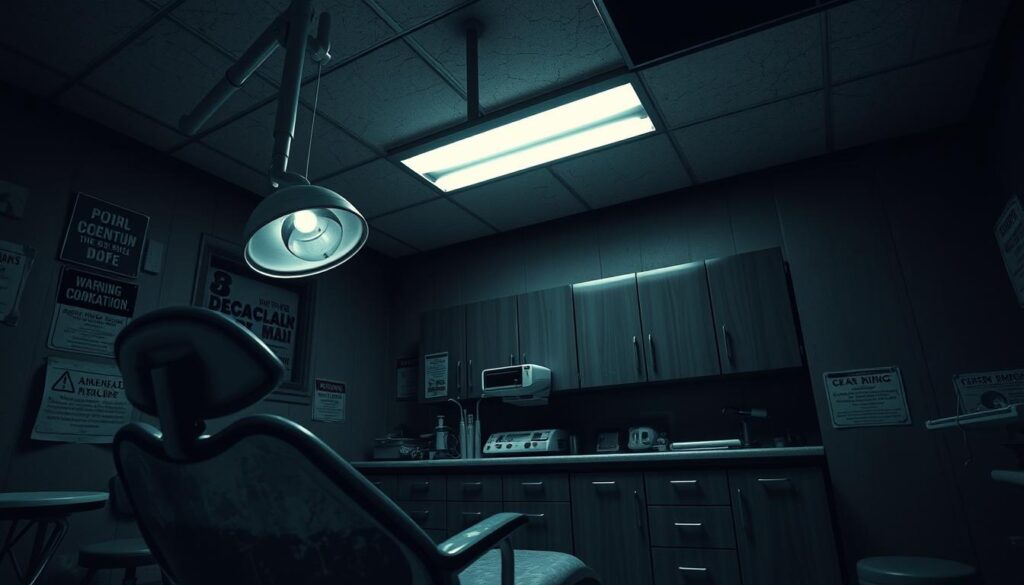When you trust a dental professional with your health, you don’t expect pain and suffering. Dental malpractice can make a simple visit a nightmare. It leads to unexpected complications and lasting trauma.
Statistics show dental malpractice is more common than people think. It accounts for one out of every seven malpractice cases in the country.
Finding your way through dental negligence is tough. A dental malpractice lawyer knows the complex world of dental legal claims. They can help you understand your rights and fight for the compensation you deserve.
If you’ve faced a surgical error, misdiagnosis, or an unnecessary procedure, a dental negligence attorney can help. With 30% of patients not knowing their legal options, professional guidance is key. It can greatly impact your recovery and financial compensation.
Table of Contents
Understanding Dental Malpractice and Legal Rights

Dental malpractice is a legal option for patients harmed by bad dental care. If dentists don’t meet standards, patients can file claims. This protects their health and rights.
Dental negligence happens when a dentist doesn’t follow the usual care rules. This can hurt patients a lot. Knowing this is key to staying safe during dental visits.
Definition of Dental Negligence
Dental negligence is when a dentist doesn’t act like a professional should. It includes:
- Breach of professional duty
- Failure to provide reasonable care
- Direct causation of patient injury
- Quantifiable damages resulting from the error
Common Types of Dental Injuries
Many lawsuits come from dental mistakes like:
- Nerve damage during procedures
- Incorrect tooth extraction
- Improper surgical techniques
- Anesthesia-related complications
Legal Standards in Dental Care
Dentists must follow strict care rules. About 60% of malpractice cases are about not diagnosing or treating right. Winning these cases is tough, with a 25% success rate. This shows how important it is to have good records and a good lawyer.
Protecting your health means understanding your rights and being prepared to seek justice when medical standards are compromised.
Signs You May Be a Victim of Dental Negligence

It can be hard to spot dental malpractice. But, some signs might show you got bad dental care. Knowing these signs is key to keeping your health safe and finding out about dental malpractice settlements.
Dental negligence can show up in many ways. It can cause symptoms and problems that shouldn’t happen. Look out for these warning signs:
- Persistent or unexplained pain after a dental procedure
- Unexpected infections following oral surgery
- Nerve damage causing tingling or numbness
- Significant complications not typical for the procedure
Oral surgery malpractice has its own warning signs. About 2% to 5% of dental work can hurt nerves, affecting your life a lot. Patients with ongoing pain or unexpected health issues should keep a detailed record of their symptoms.
Important signs of dental negligence include:
- Severe pain that doesn’t subside
- Infections developing after treatment
- Unexpected tooth loss
- Permanent nerve damage
Studies show dental malpractice cases make up 5% to 10% of all medical malpractice in the U.S. Settlements can be from $50,000 to $200,000, based on the injury’s severity.
Your health and legal rights are paramount. If you suspect dental negligence, seek professional medical and legal advice immediately.
Types of Dental Malpractice Cases
Dental malpractice can affect patients in many ways. It’s important to know about these cases to protect yourself. This knowledge helps you spot negligence and fight for your rights.

Surgical Errors and Complications
Surgical mistakes are a big worry in dental care. Issues like dental implant and tooth extraction malpractice are common. Some possible problems include:
- Nerve damage during implant placement
- Excessive bleeding during extractions
- Sinus perforation in dental implant procedures
- Incorrect tooth removal
Misdiagnosis and Delayed Treatment
Not catching dental problems early can be very harmful. Some missed or delayed diagnoses are:
- Undetected oral cancers
- Overlooked periodontal diseases
- Delayed treatment of infections
- Missed bone deterioration signs
Anesthesia-Related Issues
Problems with anesthesia are a risk in dental procedures. Some possible issues include:
- Incorrect anesthesia dosage
- Allergic reaction mismanagement
- Inadequate patient monitoring
- Improper intubation techniques
If you think you’ve been a victim of dental malpractice, document everything. Then, talk to a lawyer. This can help protect your rights and get you the compensation you deserve.
How a Dental Malpractice Lawyer Can Help Your Case

Experiencing dental negligence can be tough. A dental malpractice lawyer is there to help you fight for justice. They know how to handle dental injury claims and support you every step of the way.
A dental negligence attorney offers key services that can change your case:
- Comprehensive case evaluation
- Expert evidence gathering
- Strategic legal guidance
- Negotiation with insurance companies
- Courtroom representation
Your lawyer knows how to prove dental negligence. They look closely at your medical records and talk to dental experts. They build a strong case showing the dentist didn’t meet professional standards.
| Legal Support Area | Key Responsibilities |
|---|---|
| Case Assessment | Evaluate medical evidence and potential compensation |
| Documentation | Collect and organize medical records and expert testimonies |
| Negotiation | Pursue fair settlement with dental professionals or insurers |
| Litigation | Represent client’s interests in court proceedings |
Choosing a skilled dental malpractice lawyer boosts your chances of getting fair compensation. They turn complex legal issues into clear plans. This way, they make sure your rights are looked after during the legal fight.
Proving Dental Negligence in Court
Understanding how to win a dental malpractice case is key. It involves showing that a dentist was negligent. This means proving they didn’t meet the expected standards of care.
To win a dental negligence case, you need to prove four main points:
- Establishing a clear dentist-patient relationship
- Defining the standard of professional care
- Demonstrating a breach of that professional standard
- Proving direct causation of patient injuries
Essential Elements of a Strong Case
To build a strong dental malpractice claim, you need to gather all the right evidence. Your legal team should create a clear story. This story should show how the dentist didn’t follow the usual medical practices.
| Evidence Category | Documentation Requirements |
|---|---|
| Medical Records | Complete dental charts, X-rays, treatment notes |
| Expert Testimony | Professional evaluation of standard of care violations |
| Patient Impact | Documented physical, emotional, and financial damages |
Documentation and Expert Testimony
Expert witnesses are very important in dental malpractice cases. They help show if the dental work was wrong. A Certificate of Merit is often needed to prove your case is valid.

Most dental malpractice cases are settled before going to court. These cases usually take 12-24 months to resolve. Having all the right evidence can help you win your case.
Compensation in Dental Malpractice Claims
Understanding compensation in dental malpractice cases is key. The amount you can get varies a lot. It depends on how serious the injury is and its lasting effects.
Compensation for dental malpractice covers important areas:
- Economic Damages: This includes medical bills and lost income.
- Non-Economic Damages: This is for pain, suffering, and emotional harm.
- Future Treatment Costs: This is for future medical needs or therapy.
Settlements for dental malpractice can vary a lot:
- Minor cases: $0 – $10,000
- Moderate cases: $10,000 – $30,000
- Significant cases: $30,000 – $100,000
- Severe cases: $100,000 – $500,000
- Catastrophic cases: $1,000,000+
Your settlement will depend on several things. These include the injury’s severity, long-term health effects, and proof of negligence. A good lawyer can help you get the most from your claim.
The key is documenting every aspect of your dental injury to build a comprehensive claim.
Talking to a skilled dental malpractice lawyer is a good idea. They can give you a clear idea of what you might get. They also help you through the legal steps of dental injury claims.
Statute of Limitations for Dental Injury Claims
Knowing the time limits for dental injury claims is key to protecting your rights. Each state has its own rules for how long you have to sue after dental malpractice.
Finding your way through the statute of limitations can be tricky. A dental malpractice lawyer can guide you through the specific time limits for your case. These rules help ensure claims are handled fairly and on time.
State-Specific Time Limits
Dental injury claims have different time limits based on where you live. Here are some important points:
- Most states have a standard statute of limitations between 1-3 years
- Time limits usually start from the date of the incident or when you discover the injury
- Special rules often apply for cases involving minors
Exceptions to Filing Deadlines
There are important exceptions that can change or extend the usual filing deadlines:
- Discovery Rule: Allows claims when the injury isn’t immediately clear
- Extended timelines for patients under 18
- Continuing treatment provisions
“Time is of the essence in dental malpractice claims. Don’t wait to seek legal guidance.”
| State | Standard Limitation | Discovery Rule |
|---|---|---|
| Nevada | 3 years | 1 year from discovery |
| Georgia | 2 years | Extended for hidden injuries |
| California | 3 years | 1 year from discovery |
Talking to a dental malpractice lawyer quickly can help you understand your specific time limits. This way, you can protect your right to compensation for dental injuries.
Steps to Take After Experiencing Dental Negligence
Discovering dental negligence can be overwhelming. It might be endodontic or periodontal malpractice. Taking quick and smart action is key to protect your health and rights.
- Seek Immediate Medical Evaluation
Get a full medical check-up from another dentist. This is vital for your health and legal case.
- Gather Comprehensive Documentation
Collect all medical records, treatment notes, x-rays, and photos of your dental issue. Good documentation is important for your case.
- Preserve Physical Evidence
Save any dental tools, implants, or evidence that supports your claim. These items are key to proving negligence.
Knowing your legal options is crucial. In New York, you have 2.5 years to file a dental malpractice case after the injury.
| Action Step | Recommended Timeline |
|---|---|
| Medical Evaluation | Immediately after suspecting malpractice |
| Document Collection | Within 30 days of incident |
| Legal Consultation | Within 6 months of discovery |
Talking to a dental malpractice attorney is wise. They can help you understand your case, explore compensation, and meet deadlines.
Choosing the Right Dental Malpractice Lawyer
Finding the right dental negligence attorney is crucial. You need to research and evaluate carefully. Look for lawyers with experience in medical and dental injury claims. They should have a track record of winning cases similar to yours.
Check if the lawyer knows a lot about dental negligence law. Ask about their success rates and experience with dental malpractice. A good lawyer will offer a detailed first meeting, reviewing your case and giving a honest opinion.
Your lawyer should know medical experts who can help your case. Check their credentials, read reviews, and see if they’ve handled dental injury cases before. Remember, 75% of successful cases are handled by lawyers who specialize in dental law.
Talk about possible compensation and how long your case might take during the first meeting. A good lawyer will explain the challenges and chances of your case. This will help you decide if you should take legal action for your dental injury.

